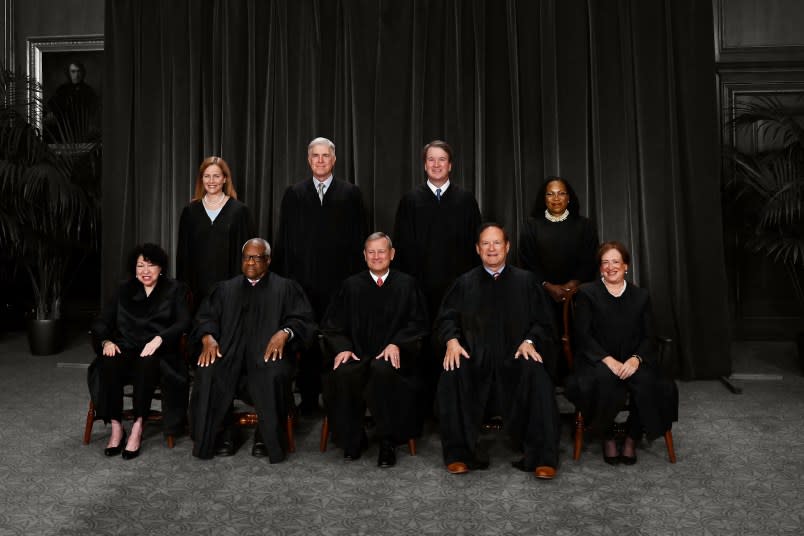Supreme Court Will Hear Trump Disqualification Clause Case In February

- Oops!Something went wrong.Please try again later.
The Supreme Court announced Friday afternoon that it will hear oral arguments February 8 on the Colorado Supreme Court’s ruling that Donald Trump is ineligible to run under the Constitution’s disqualification clause due to his role in the Jan. 6 insurrection.
The Court was near certain to take up the case after both parties requested that it do so, and because similar cases are brewing in other states.
The case is on an expedited timeline, though a slightly slower one than the voters who triumphed in Colorado state court had requested. They wanted oral arguments on January 19, “so that the Court may issue a ruling before in-state Colorado voters begin receiving their ballots on February 12 and well before Super Tuesday.”
Leading up to the Court’s February oral arguments, initial briefs will be due January 18, with respondents’ reply due January 31. Any further reply brief is due February 5.
The Court did not specify which questions it would hear in the Friday order, a major point of contention between the parties that might have indicated where the case is headed. Questions suggested by the parties range from whether Congress needs to pass legislation to make the disqualification clause enforceable to whether Trump engaged in insurrection.
Since the Court accepted Trump’s petition to take up the case, it may suggest that they’ll also request briefing on the questions he raised in his brief. Technically, he asked only one — “Did the Colorado Supreme Court err in ordering President Trump excluded from the 2024 presidential primary ballot?” — though in the briefing itself, he seems to ask several separate questions, including urging the Court to review the Colorado courts’ interpretation of state law, a request that is seemingly outside the U.S. Supreme Court’s jurisdiction.
There are many paths the Supreme Court could take in the case, including more procedural off-ramps that would let it avoid the most hot button arguments. Team Trump argues, for one, that the disqualification clause never applies to presidents — an argument that, if the justices accepted it, would seem to zero out the multi-state effort to disqualify Trump without touching on the former president’s specific behavior.
That nationwide push has had varying levels of success, with Colorado as the first state to block Trump from the ballot and Maine close behind. In the latter state, the secretary of state made an administrative ruling barring Trump from the ballot, which he has appealed to state superior court. A ruling there is expected in mid-January, with the final word from the state Supreme Court by the end of the month.
The Supreme Court is expected to end up involved in another high-profile Trump dispute, as he fights to prove that sweeping presidential immunity protects him from special counsel Jack Smith’s Jan. 6 prosecution. The Court — without explanation or any noted dissents — declined Smith’s request for the justices to take up the question on an expedited basis, instead sending it back down to the D.C. Circuit.
Still, Friday’s order in the disqualification case may concern the former president in terms of the Court’s willingness to expedite briefings and arguments; Trump is trying to drag Jack Smith’s case out past 2024, so he can make the Justice Department drop it if he’s reelected.
Read the order here:

